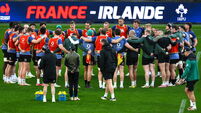Lilywhites losing their honour in Johnston pursuit
No words were spoken. None were needed. The eyeballs said it all.
The incident occurred during a series of rain-drenched sprinting drills. As he waited for his next run, McGeeney walked a short distance to pick up a water bottle.











